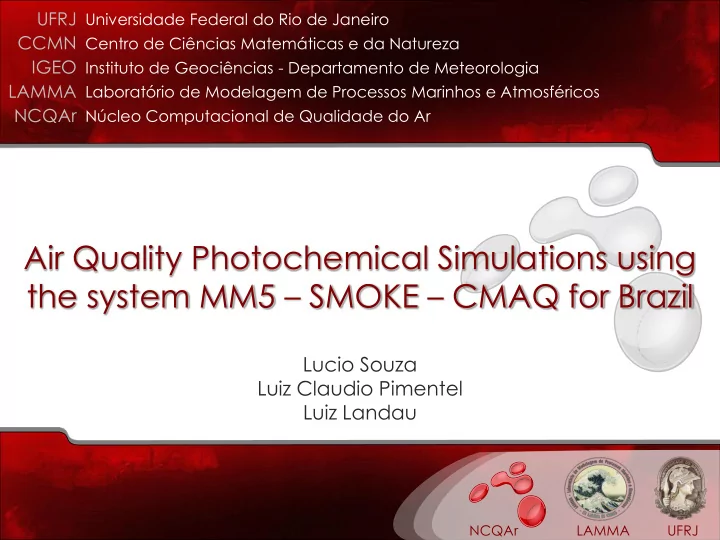

UFRJ Universidade Federal do Rio de Janeiro CCMN Centro de Ciências Matemáticas e da Natureza IGEO Instituto de Geociências - Departamento de Meteorologia LAMMA Laboratório de Modelagem de Processos Marinhos e Atmosféricos NCQAr Núcleo Computacional de Qualidade do Ar Air Quality Photochemical Simulations using the system MM5 – SMOKE – CMAQ for Brazil Lucio Souza Luiz Claudio Pimentel Luiz Landau NCQAr LAMMA UFRJ
The CMAQ model has been implemented to Brazil, with focus to the Amazonia area; Feeding emissions data into South America and its surroundings has been our biggest challenge; The changes in Landuse, the intense economic growth linked to the need for preservation make the environmental management a complex task for Brazilian Amazonia area. Núcleo Computacional de Qualidade do Ar
The system is driven with MM5 met runs, global emissions data feeded into smoke model, MEGAN model for biogenics and CMAQ for air quality forecast; Composed with an external grid that cover almost all south american countries, horizontal resolution of 37 km, and 32 vertical levels (8 in PBL); No GCM model data are adjusted to these initial runs. Núcleo Computacional de Qualidade do Ar
main area Table 1 – MM5 Parameterizations. Cumulus Grell (1993) domain 1 and 2¹ Clouds Dudhia (1989) Microphysics Radiation Dudhia (1989) Landuse model NOAH LSM Landuse (Chen e Dudhia, 2001) Mellor e Yamada (1974, PBL 1982) 1. Not applied for horizontal resolutions under 10 km Figure 1 Arch of deforesting Arch of sustainable development Núcleo Computacional de Qualidade do Ar
Process emission data from the inventory format into the one required by CMAQ; Feeded with global emission inventories data (www.geiacenter.org); GEFED 1º x 1º (Biomass burning); IBGE (Main National Roads then em fact from GIS tools); Shipping Emissions (from GIS tool) and some global emissions (also GIS) for the surrounding countries; MEGAN model for the Biogenics. Núcleo Computacional de Qualidade do Ar
CCTM solve the ADE; In our case the chemical mechanism used is CB05 (not the objective to set up one at this moment); Resolution of 37 km for the coarse domain; Run for August 2005, intense dry season in Amazonia. Núcleo Computacional de Qualidade do Ar
CMAQ MM5 / WRF MET INPUTS CCTM IC BC JPROC I/O API MCIP MEGAN Spatial SMOKE Allocator Area point MOB BIOS (GIS) MG2IOAPI PFTF EF LAI MEGAN MG2SPC GIS Núcleo Computacional de Qualidade do Ar
emissions from MEGAN Figure 2 Ozone emissions for 1600 LT Figure 3 Ozone emissions for 1700 LT Núcleo Computacional de Qualidade do Ar
from CMAQ Figure 4 Ozone forecast for 1700 LT Figure 5 Ozone forecast for 1800 LT Núcleo Computacional de Qualidade do Ar
from CMAQ Figure 6 NO forecast for 1000 LT Núcleo Computacional de Qualidade do Ar
aug 3 rd Animation 1 IDV ISO 217 Núcleo Computacional de Qualidade do Ar
(anthropogenic) Animation 2 IDV NO 2 217 Núcleo Computacional de Qualidade do Ar
aug 3 rd Animation 2 IDV Ozone 217 Núcleo Computacional de Qualidade do Ar
The system is implemented to Brazil part of South America; Results shows that this procedure (emission data from global to regional) might be considered as an alternative for those without NEI; MEGAN is the best choice for Biogenics; CMAQ represented Ozone Fields according to the theory, besisdes neglecting important emissions The System needs some improvements (projection, emiss, chem mechanism. Núcleo Computacional de Qualidade do Ar
UFRJ Universidade Federal do Rio de Janeiro CCMN Centro de Ciências Matemáticas e da Natureza IGEO Instituto de Geociências - Departamento de Meteorologia LAMMA Laboratório de Modelagem de Processos Marinhos e Atmosféricos NCQAr Núcleo Computacional de Qualidade do Ar Air Quality Photochemical Simulations using the system MM5 – SMOKE – CMAQ for Brazil Lucio Souza Luiz Claudio Pimentel Luiz Landau NCQAr LAMMA UFRJ
Recommend
More recommend